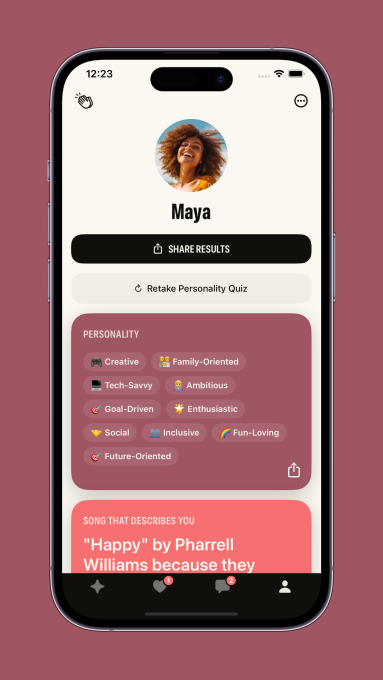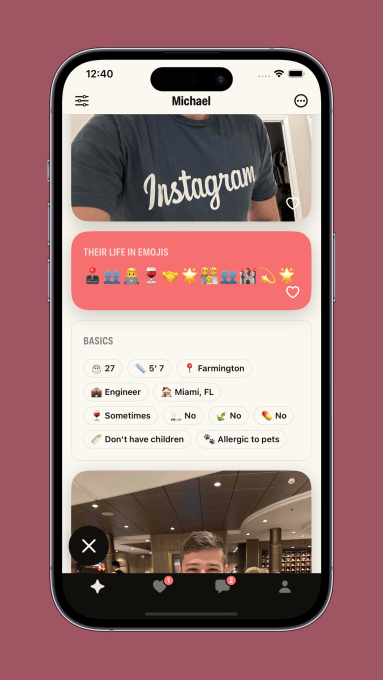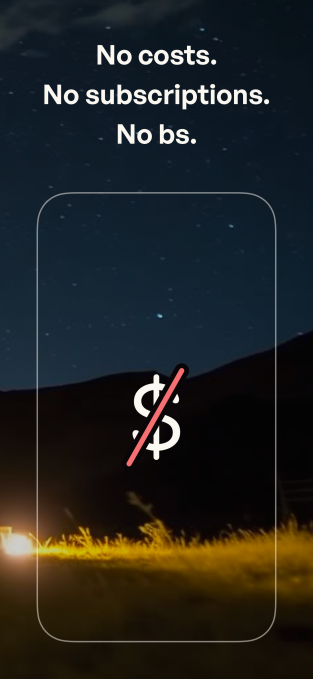A new dating app called Cosmic wants to shake up the market by not charging for basic features like seeing who likes you or undoing your last swipe, while also making it easier for users to build profiles that better reflect their personalities using a combination of personality quizzes and machine learning technology.
Now available to the public, Cosmic is the first product to debut from the startup Friendly Apps, founded by longtime engineer and product designer Michael Sayman and backed by $3 million in seed funding.
The developer has been building apps since he was young — an experience he documented in his book, “App Kid” — which helped him land roles at Facebook, Google, Roblox and, most recently, Twitter, pre-Elon Musk’s acquisition. At Twitter, Sayman was going to focus on building product experiences for teens, but those efforts slowed down after the takeover, giving him the push he needed to go out on his own.
The idea behind his new company is to create a suite of apps with a different set of values that are targeted toward helping people achieve their goals without being toxic to users’ health, as many modern-day social apps have become.
To start, Sayman has decided to tackle the world of online dating — a market he believes users have grown increasingly frustrated by. Today’s dating apps may be easy to use in terms of their user interface, Sayman explains, but they’re hard to use in terms of actually helping you find what you’re looking for.

Image Credits: Friendly Apps
“A lot of times I’ll go on dates with people that end up not really being the type of person I thought they were because of the lack of depth that a lot of [dating app] profiles are able to offer,” the founder explains. “Also, I think, just due to the nature of how these apps work, I don’t see a lot of us, including myself, sharing a whole lot of our personality — or the way that we are — on the app. We put a bunch of pictures up and a public bio and that’s kind of it,” he says.
Cosmic aims to do things differently.
Instead of having users create their bio, it presents you with a personality quiz that asks you just a few questions about yourself — like “What do you like to do for fun?,” “What’s most important to you in life,” or “What are your dreams for the future?.” These answers are private to the end user — they’re not published on your profile. When complete, the app uses your answers to create a profile for you with the help of machine learning (ML) technology.

Image Credits: Friendly Apps
Sayman says he came up with this idea because he felt that a lot of people, himself included, aren’t great at describing themselves in bios. He says that his bio either ends up missing aspects of his personality because he doesn’t know which parts to include or which to skip.
He realized that a different way of creating bios could work better, where users wrote open-ended answers to a personality quiz, which ML technology could then use to generate your entire profile for you.
To work, Cosmic extracts personality traits out of the words that you use in the quiz, including the interests that you have, as well as fun stuff — like what popular song describes your life, the key to your heart, or your greatest strength.

Image Credits: Friendly Apps
“The cool part about it is it actually tells you a lot more about somebody than I think a lot of us are able to write out ourselves,” Sayman says.
The Q&A-powered dating app differs from something like eHarmony, which also relies on quizzes because Cosmic is not comparing your results to someone else’s in order to make a match. Instead, it’s using the answers you provide to create your profile and fill in Hinge-like prompts for you.
Sayman coded and designed the app himself without a team, and leveraged a combination of both open source and proprietary technology under the hood.
However, he stresses that AI is not actually writing out a full bio for you, as some other apps promise to do. That’s something he thinks feels fake.
“They don’t work. It’s frankly, I think, a little bit dishonest,” he says of AI-generated bios. Instead, Cosmic relies on answers to prompts and tags that describe your personality, like “creative,” “tech-savvy,” “ambitious,” “family-oriented,” and so on.
The personality quiz and AI aspects aren’t the only differentiators for Cosmic’s dating app. The app also doesn’t charge for things like undoing mistaken swipes or seeing who likes you.
“There’s no boost. There’s no subscriptions. There’s no ads. There’s none of that stuff,” Sayman says. There are, however, standard features like photo uploads, blocking and reporting, and various spam prevention tools.

So how will the app monetize?, we wondered. That’s a question the founder plans to figure out later on — after he determines if this model even works.
The app is available today in the U.S., Peru (where Sayman’s parents are from), Colombia, and a few other countries in South America and Europe. Prior to launch, it has been tested only with a couple hundred beta users.
from TechCrunch https://ift.tt/9caKjgf

Comments
Post a Comment